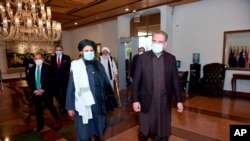Afghanistan's foreign ministry issued a statement Friday expressing regret and concern about videos showing senior Taliban leaders meeting their followers and Taliban fighters in Pakistan.
In cell phone video that surfaced on social media in the last few days, the head of the Taliban’s political office, Mullah Abdul Ghani Baradar, seems to be briefing a Taliban cadre on the ongoing peace negotiations in Doha and acknowledging the presence of the Taliban’s top leadership in Pakistan.
In another video, a member of the Taliban’s political team is seen meeting men wearing uniforms used by Taliban fighters. Although the clothing of Taliban fighters in the video suggests it could be older. None of the fighters are wearing a sweater or a jacket as they stand in line outside, and some of the fighters are bare foot, indicating the weather to be warmer rather than the current harsh winter months.
“It is with deepest regret and concern that some Taliban leaders were seen in the videos visiting training camps,” the Afghan statement said, decrying the “overt presence and activities” of Taliban fighters and leadership in Pakistan.
“We urge the Pakistani government not to allow its territory to be used by insurgents and elements who insist on continuing the war and bloodshed,” the Afghan foreign ministry said.
When contacted, Pakistan's foreign office spokesman refused to comment.
The Taliban delegation arrived in Pakistan last week to meet the country’s prime minister and foreign minister to discuss the Afghan peace negotiations in Doha between the Taliban and the Afghan government.
Pakistan said the visit was “to facilitate the Afghan peace process to achieve a peaceful, stable, united, independent, sovereign and prosperous Afghanistan.”
At the time, the Afghan government said the visit was planned in consultation with them and welcomed it as part of Pakistan’s efforts to forward the peace talks.
In the video, Mullah Baradar told his followers the Taliban negotiation team in Doha was following orders from its top leadership in Pakistan.
“Whatever we discuss in Doha, we share it with our leadership and the Ulema Council here. They have their own consultation and give us their feedback,” he could be heard telling the men standing around him.
In another portion of the same video, he referred to a telephone conversation he had with U.S. President Donald Trump.
“I cut the phone; he [Trump] didn’t cut the phone. He doesn’t speak with anyone for more than 10 minutes, but he talked to us for a long time,” Baradar said.
President Trump called Baradar in early March 2020, days after the U.S. signed a historic deal with the insurgent group, laying down a timeline for the withdrawal of foreign forces from Afghanistan in return for the Taliban providing counterterrorism guarantees and breaking ties with terrorist groups like al-Qaida.
“I’ll be meeting personally with Taliban leaders in the not-too-distant future. And we’ll be very much hoping that they will be doing what they say they’re going to be doing: They will be killing terrorists,” Trump told journalists in Washington after the call.
The face-to-face meeting never materialized.
In another part of the same video, Baradar referred to the visit of Secretary of State Mike Pompeo to Doha in November.
“When we went to meet the U.S. Secretary of State, he was already waiting for us. He sat down when we sat down, he stood up when we stood up. It is not my personal dignity; it is due to all the sacrifices you made,” he told his followers.
Pompeo met the Taliban in Doha to encourage peace negotiations and a reduction in violence that has become the most urgent demand of the Afghan government and civil society.
In March, Trump described the phone call with Baradar as a “good conversation.” The State Department said Pompeo told the Taliban that “the people of Afghanistan expect and deserve to live in peace and security after 40 years of war and bloodshed.”
Even though the Taliban have stopped directly attacking foreign forces since the deal with the U.S., it has increased its attacks against Afghan security forces, which often kill civilians as well.
“He [Pompeo] called for a significant reduction in violence and encouraged expedited discussions on a political roadmap and a permanent and comprehensive cease-fire,” said a State Department readout of the meeting.
Baradar, in the video, assured his followers the Taliban negotiation team will “never compromise, never undermine your sacrifices.”
Direct negotiations between the Taliban and the Afghan government started in September in Doha. The two teams are taking a three-week break in December for internal deliberations and are expected to begin again on January 5, 2021.




